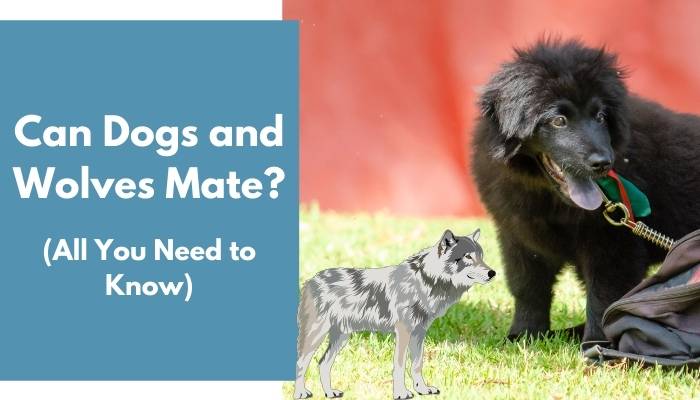A dog breed that is half a dog and half wolf is a wolfdog hybrid. Domesticated dogs and wolves share an evolutionary past that makes them share similar physical, behavioral, and genetic composition attributes.
Can dogs breed with wolves? Yes, dogs can breed with wolves because they are the same species.
Dogs and wolves belong to the same biological family with a similar number of a chromosome, genetic composition, and arrangement that can breed. These canine species can produce fertile offspring that can reproduce their kind in the future.
However, breeding wolves and dogs can be detrimental, especially to wild wolves. On the other hand, the wolfdog hybrid is not acceptable to become a pet.
This article will help you know more about dogs breeding with co-specie such as wolves or coyotes.
Read some of the facts about the breeding of domesticated dogs with coyotes or wolves and the reasons why you should stop mating your dog with a wolf.
Contents
Do Coyotes And Dogs Interbreed?
Yes, dogs and coyotes do interbreed.
Both dogs and coyotes came from the Canidae family under Canids’ subfamily. Thus, dogs and coyotes share the same genetic pattern and a similar number of chromosomes.
This makes these two species biologically related to each other, making them capable of producing interbreeding and producing hybrid offspring. Since they can create a viable litter, their offspring can also produce offspring themselves.
These species are also known as Canid hybrids, a product of interbreeding between domestic dogs and wild Canids or coyotes.
Their chromosomes were arranged in 39 pairs with a total number of 78, which allows them to produce fertile litters because of the similarities in their genetic components.
Dogs evolved from other wild Canidae families, such as coyotes, thousands of years ago until they became domesticated. The process by which a wild animal can adapt to living with humans has undergone domestication.
Due to this, a dog’s behavior, personality, lifestyle, and physiology have also been altered from a coyote.
This means that even if they are possible to interbreed, it is still rare to find a documented evidence of dogs in the genetic makeup of coyotes in the wild, which will serve its proof of producing viable offspring.
Dogs and coyotes also differ in their mating behavior, which makes it difficult for them to produce fertile offspring. A female coyote is different when in heat compared to dogs.
Coyotes are known to be seasonal breeders in which domesticated dogs are not. Thus, coydogs may have lower fertility in comparison to domestic dogs or 100% coyotes.
There will be parenting issues also in attending dogs and coyotes’ litter. It is usual for male coyotes to nurture their offspring, where else dogs and coydogs do not care that much.
Also Read:
Can A Dog Get Pregnant By A Wolf?
This fact is intriguing to many people, especially to those who wish to own a wolfdog pet. Yes, a female domesticated dog can get pregnant by a wolf.
Biologically speaking, the two of them are genetically related because they both came from the same genus, the Canidae family.
Both of them can mate freely with each other, and their pups can be more like a wolf or dog in character, which significantly depends also on the dog’s breed.
A dog that got pregnant by a wolf may produce a hybrid known as a wolfdog. These species of dogs are described as high, mid, or low content concerning the characteristics and traits of a wolf.
The most common wolfdog species is a combination of domesticated dogs and subspecies of the gray wolf.
Most popular wolfdog breeds found across the globe include – Siberian husky, German shepherd, Native American Indian, Tamaskan dog, etc.
This wolfdog shares similar DNA with wolves. However, others would tell that their wolf-like traits are switched off, making them easy to tame.
But some signify taming a wolf dog is not possible. Hence, they are more dangerous to become pets.
Dogs that get pregnant by a wolf still undergo the same process, such as getting pregnant once they are in their estrus cycle and carry their offspring for nine weeks inside its uterus.
Though there have been researchers trying to distinguish dogs, wolves, and a wolfdog, shreds of evidence years ago are still lacking to support their claim. Even if a dog getting pregnant by a wolf is possible, it is still rare to happen, especially in a natural setting.
This is not a common occurrence, especially domesticated dogs and wolves do not cross paths most of the time. If they do, it’s pretty sure not a friendly encounter.
What To Do If You See A Wolf With Your Dog?
Wolves can be aggressive to domesticated dogs. They may act in a defensive manner in certain circumstances, especially when interacting with humans.
Sometimes, seeing a wolf in urban places such as in your yard is an indication that they get habituated already.
This only means that wolves lose their natural fear of humans because people fed them. Thus, they can associate humans with food.
If you see a wolf with your dog, you need to act calmly rather than turning back immediately and running away.
Keep eye contact with the wolf while standing tall to make yourself look larger. You can go and stand between your dog and the wolf to end a possible aggressive encounter.
But if they are already in a physical fight, it’s better to move away than getting injured. The better way to break its fight is to use a bear spray or a powerful hose from a safe distance.
However, there are some cases where wolves do not just retreat that quickly. They may act weird by being so aggressive, holding their tails high, raising their hackles, barking, or howling. The only possible way for you is to yell or throw things at it while slowly moving back away.
If it attempts to attack you, try to fight back aggressively to show you are too dangerous to attack.
There have been cases already that people got injured while trying to break a fight between their dog and a wolf.
Why Do Wolves Try To Mate With Dogs?
Since wolves and dogs came from the same family with similar genetic makeup, wolves get attracted to dogs and dogs to wolves.
Wolves and dogs undergo the same heat cycle, which is the reason why these animals have the urge to look and find a mate.
Female dogs, when in heat, draw male wolves near them. And at the same time, intact male dogs can be driven by the urge to wander or get lured by a female wolf.
These female dogs release a pheromone that can sexually arouse male dogs as well as male wolves that can pick up the scent. This is why wolves would want to try mating with dogs.
Besides, mating can be possible for these two species since they are interfertile, which can produce viable hybrid offspring.
Should You Stop Your Dog From Mating A Wolf?
Scientifically speaking, nothing can stop your dog from mating with a wolf. The same also goes for wolf mating to a domestic dog. They belong to the same family, which explicitly allows them to breed and produce litters.
But is it fine for your dog to mate with a wolf? It is okay somehow; however, there are problems that may arise if a dog mates with a wolf.
Thus, this could be the reason why you should stop your dog from mating a wolf.
A mating dog and wolf can produce a hybrid offspring called a wolfdog. This species usually becomes unhappy and is only suited in the wild or captivity.
Wolf hybrids are not suitable as pets. Some would believe that these hybrids are extra dangerous to humans because they are wolf-like animals.
There are assumptions that there is no amount of socialization or training that may be sufficient to make all wolf hybrids safe to keep as pets. Also, data showing that bite from wolf dogs ranks sixth among dog bite fatalities among other dog breeds.
Wolf brings fatal diseases to domestic dogs, which can be another reason you should stop your dog from mating with a wolf.
This species can host numerous infectious and parasitic diseases, including canine distemper, canine hepatitis, etc.
Also, dogs mating with a wolf, especially in the wild, could turn out to be a suicide, especially for mutts.
Wolves are territorial, which leads them to protect their home ranges from intruding canines such as dogs, coyotes, and even other types of wolves.
Thus, they may act aggressively towards the dogs.
In order to stop your dog from mating with a wolf, you can opt to sterilize your male or female dog. Spaying or neutering your pet will lessen its hormone level related to the motivating factor that urges them to mate.
Also, avoid providing food to many wild animals, especially wolves, so that they would not lose their fear of humans.
Summary
In summary, wolves are born to be wild animals, shaped by their environment to survive. On the contrary, dogs are taken to adapt to living with humans and molded to be more dependent on humans for their survival.
It is not impossible for dogs to breed with coyotes or wolves, for they belong to the same taxonomic family of Canidae.
They can produce viable offspring. This hybrid can also reproduce its own.
However, there are certain risks or problems when breeding them. Dogs, wolves, and coyotes vary in terms of behavior and lifestyle.
Dogs are domesticated and are reared to live with humans as loving pets. On the other hand, wolves live in the wild. They used to move freely and hunt their food for survival.
Both of them are territorial in nature. A dog that is spotted nearby these aggressive creatures can be attacked by a wolf.
While for wolves roaming around near domesticated dogs poses a threat to safety not only to dogs alone but as well as to humans.
Though, there are claims that when dogs breed with wolves, they can produce a hybrid that can be tamed and trained. But, most studies suggest that dog and wolf hybrids or known as wolf dogs are not made to become pets even if nurtured with humans.
Nevertheless, if breeding this wolf and dog is your hobby. It is then necessary for you to be responsible and prepared enough to handle that animal’s physical and psychological needs.
However, hybrids are a very complicated issue to take.
Resources
Image credits – Canva



